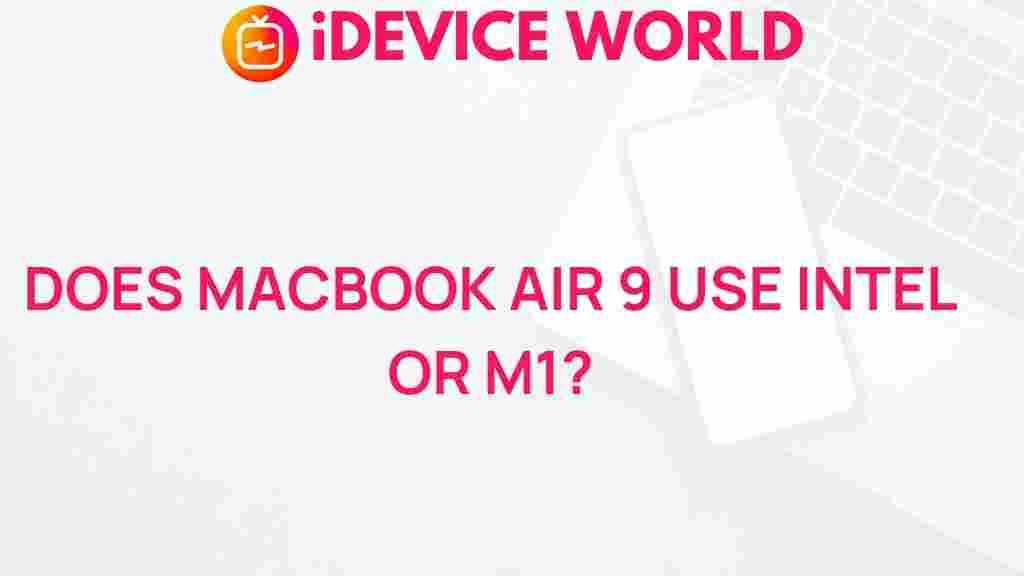Unveiling the Mystery: Does MacBook Air 9 Use Intel or M1 Processor?
The MacBook Air 9 has captured the attention of tech enthusiasts and everyday users alike, thanks to its sleek design and impressive performance. One of the most pressing questions surrounding this device is whether it is powered by an Intel processor or the newer Apple M1 chip. Understanding the processor type is crucial for potential buyers and users who want to maximize their device’s performance. In this article, we will delve into the specifics of the MacBook Air 9, comparing its processors, and guiding you through the decision-making process.
The Evolution of MacBook Air
To appreciate the MacBook Air 9, it’s essential to understand its lineage. The MacBook Air line has undergone significant changes since its inception, shifting from Intel processors to Apple’s in-house M1 chip.
- 2010: The first-generation MacBook Air debuted with Intel processors.
- 2020: Apple introduced the M1 chip, marking a significant transition in its product line.
- Present: The MacBook Air 9 represents a new era of performance and efficiency.
Understanding the Intel vs. M1 Debate
Before determining which processor powers the MacBook Air 9, let’s examine the differences between Intel and M1 chips:
- Performance: The M1 chip has been lauded for its superior performance compared to Intel’s offerings, particularly in tasks involving graphics and machine learning.
- Efficiency: M1 chips provide better power efficiency, leading to longer battery life.
- Compatibility: Intel processors offer broader compatibility with existing software applications, especially older ones.
Identifying the Processor in Your MacBook Air 9
Determining whether your MacBook Air 9 features an Intel or M1 processor is a straightforward process. Follow these steps:
Step 1: Check Your Mac’s Specifications
1. Click on the Apple logo in the top left corner of your screen.
2. Select “About This Mac” from the dropdown menu.
3. In the Overview tab, you will see your processor type listed under the name of your MacBook Air.
Step 2: Verify System Report
If you want more detailed information about your processor:
1. In the “About This Mac” window, click on “System Report.”
2. Under the “Hardware” section, select “Hardware Overview.” Here, you will find detailed specifications about your processor.
Comparing the MacBook Air 9’s Processors
When comparing the processors in the MacBook Air 9, it’s essential to consider various aspects:
Performance Benchmarks
Benchmarks indicate how the processors perform under specific workloads. The M1 chip outperforms Intel chips in several areas:
- Single-Core Performance: The M1 chip has shown to exceed Intel’s single-core performance benchmarks.
- Multi-Core Performance: The M1’s architecture allows for impressive multi-core performance, especially in demanding applications.
Battery Life
Another crucial factor for users is battery life:
- M1 Chip: Offers up to 18 hours of battery life under typical usage conditions.
- Intel Chip: Typically provides around 10 to 12 hours of battery life.
Troubleshooting Common Issues
Whether you’re using a MacBook Air 9 with an Intel processor or the M1 chip, you may encounter some common issues. Here are some troubleshooting tips:
1. Performance Lags
If you notice performance lags, try the following:
- Close unnecessary applications.
- Restart your Mac to clear cached data.
- Check for software updates under “System Preferences.”
2. Battery Drain
To manage battery life effectively:
- Reduce screen brightness.
- Disable Bluetooth and Wi-Fi when not in use.
- Use Battery Preferences to manage app usage.
3. Software Compatibility
If you experience issues with specific software:
- Check if the application is optimized for the M1 chip.
- Consider using Rosetta 2 for compatibility with Intel-based apps.
Conclusion
In summary, the MacBook Air 9 represents a pivotal moment in Apple’s history, showcasing the power and efficiency of the M1 chip. While it is crucial to recognize the legacy of Intel processors in earlier models, the advancements in the M1 chip offer compelling benefits for users. By understanding the differences, identifying your processor, and knowing how to troubleshoot common issues, you can make the most out of your MacBook Air 9. Whether you’re a student, a professional, or a casual user, this device has something to offer.
For more information on maximizing your Mac experience, check out this helpful guide here. Additionally, for more insights into the evolution of MacBook models, visit this external link.
This article is in the category Reviews and created by iDeciveWorld Team

2 thoughts on “Unveiling the Mystery: Does MacBook Air 9 Use Intel or M1 Processor?”